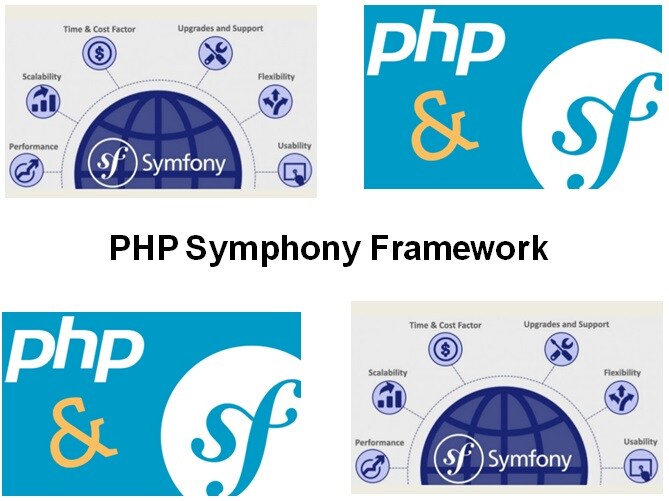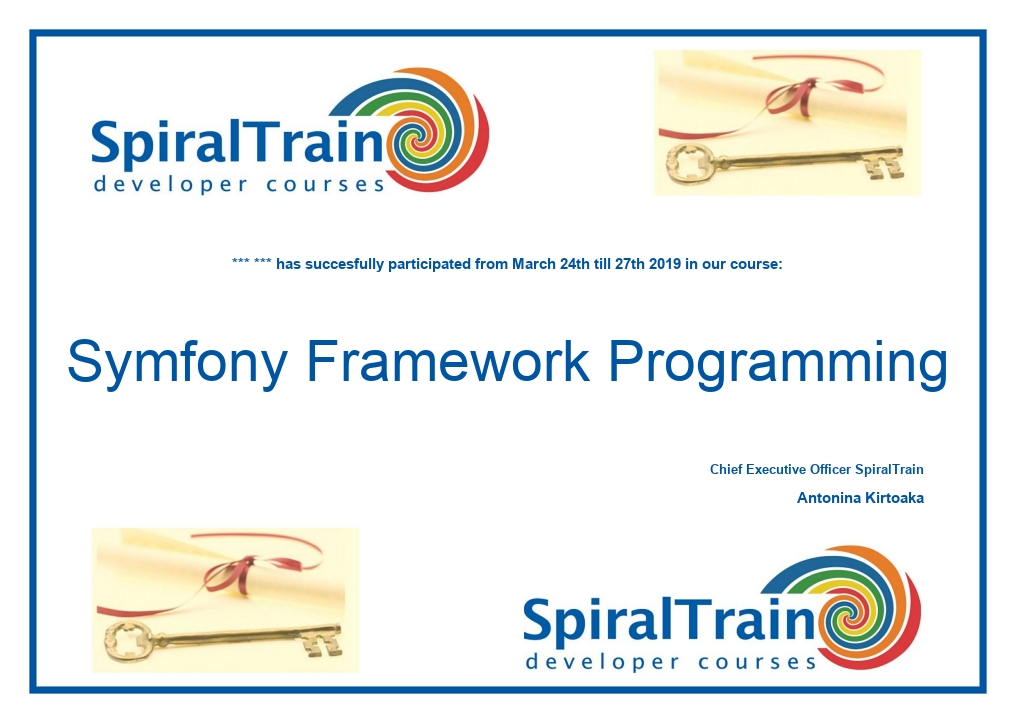-
Learning by doing
-
Trainers with practical experience
-
Classroom training
-
Detailed course material
-
Clear content description
-
Tailormade content possible
-
Training that proceeds
-
Small groups
In the course Symfony Framework Programming participants learn how to build modern PHP applications with the latest version of the state of the art Symfony Framework.
Symfony has evolved in recent years into one of the most popular PHP frameworks. This is due to the ease of use, the good performance, the dependency injection mechanism and directly deployable components.
In this course you will learn to install Symfony and prepare an environment for application development. Symfony's routing architecture is discussed, the handling of requests and the generation of responses.
Attention is paid to Twig templates en template inheritance.
Next the Doctrine Object Relational Mapping implementation is discussed. Using Doctrine PHP classes and their relations can be stored in the database.
Symfony offers many facilities for Forms and these are discussed extensively. Also the validation of forms is treated.
Attention is paid to service classes, the service architecture and the registration of services with the container.
The security facilities that Symfony has to offer, like authentication and authorization with the User Entity class are discussed as well.
Also part of the subject matter are advanced subjects like Symfony's kernel, hooking into the routing mechanism and the implementation of dependency injection.
Finally attention is paid to the creation of a Rest API with Symfony. At the end of the course you will have completed an extensive case study with Symfony and you are able to create robust Web applications with Symfony.
PHP developers who want to develop robust and maintainable Web Applications with the Symfony PHP Framework.
Experience with PHP Programming and object oriented development with PHP is required to participate in this course.
The theory is treated on the basis of presentation slides. The concepts are illustrated with demos. The theory is interspersed with exercises. The course times are from 9.30 to 16.30.
The participants receive an official certificate Symfony Framework Programming after successful completion of the course.

Module 1 : Symfony Intro |
Module 2 : Bundles |
Module 3 : Data Access |
|
Why Symfony? Installing Symfony Console commands Namespaces Controller and Route How bright is the future? Installation Composer and Packagist Installing Symfony via Composer The road map Checking the installation |
Request and Response Life Cycle Anatomy of a bundle Generating a new bundle Best practices Custom bundles versus AppBundle Creating templates with TWIG Controller/View interaction Conditional templates Installing bundles Data fixtures Defining and prioritizing features |
Database configurations Generating an entity What is Object Relational Mapping Entity Classes Using doctrine Inserting new Objects Adding Columns Updating Table Schema Database Migrations Migrations Workflow Nullable Columns |
Module 4 : Caching in Symfony |
Module 5 : Presentation Layer |
Module 6 : Security in Symfony |
|
Caching in Symfony Definition of a cache Caches in a Symfony project Key players in the Reverse proxy cache Set expiration for dashboard page Expiration stategies Validation strategies Doctrine cache ESI for selective caching Sophisticated bundles |
Asset management How templates are organize Navigate or not to navigate What is Bootstrap? Bootstrap configuration Creating menus Rendering the menu Dashboard template Overriding templates Profile-related templates Changing the backend logo |
Authentication Authorization User Class Dashboard and Security Security is organization Authentication Authorization FOSUserBundle Security settings Adding FOSUserBundle Adding routes |
Module 7 : Testing |
Module 8 : Forms and Validation |
Module 9 : Rest API |
|
TDD and BDD with Codeception Creating a functional test Developing the missing code Creating the unit tests Setting up the database Recreating the database for test Creating unit tests Writing code to pass test Running functional and unit tests On the CI side of the story |
Form Input Filtering Validating Forms Creating Forms Save and Redirect Flash Messages Utilities Validators Decorators Sub Forms |
What is REST? Resource ID’s REST Web Services Simple REST Examples REST Web Service Principles Multiple Representations Embedded Path Parameters Common REST Patterns Resources URI Access JavaScript Object Notation (JSON) |
